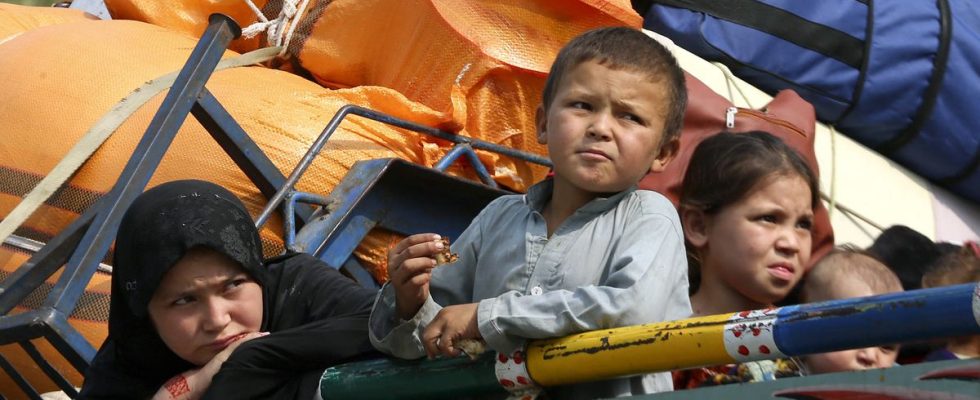There are 1.7 million Afghans living in Pakistan. All must leave by November 1 by order of the Pakistani authorities. As of Tuesday, more than 10,000 Afghan migrants rushed to the border on Tuesday. From Wednesday, Afghans in an irregular situation risk being arrested, placed in detention centers, then deported to Afghanistan.
Some decided not to wait and preferred to leave without delay. Kabul, where the Taliban now reign, denounced a measure of “harassment”. The increase in attacks, the economic crisis and tensions with the Afghan government explain this decision, according to analysts.
Why does Pakistan have so many Afghans on its soil?
Pakistan is one of the countries hosting the most refugees in the world, the vast majority Afghans, who have flocked during the last four decades of war. Most live in the province of Khyber Pakhtunkhwa, bordering Afghanistan, whose population often shares the same Pashtun ethnicity with them.
According to the latest UN figures, Pakistan has around 1.3 million registered Afghan refugees. The Pakistani authorities estimate that there are 1.7 million Afghans living illegally in Pakistan.
At least 600,000 Afghans have arrived in Pakistan since the Taliban returned to power in Afghanistan in August 2021, according to the UN, many of them seeking asylum in third countries. Pakistan is not a signatory to international conventions relating to the status of refugees, nor does it have national legislation guaranteeing their protection.
Why did Pakistan decide to expel the Afghans?
The Pakistani government justified itself by the deterioration of security in the northwest of the country, on the border with Afghanistan, where attacks have increased in recent months. Announcing the deadline for voluntary departures in October, Pakistani Interior Minister Sarfraz Bugti said that several suicide attacks had been carried out by Afghan nationals.
For years, Pakistan’s military and intelligence apparatus has been suspected of supporting the Taliban insurgency against the pro-Western government in Kabul. But relations between the two neighbors became enormously strained after the Taliban came to power.
Islamabad accuses them of letting the Pakistani Taliban Tehreek-e-Taliban Pakistan (TTP) prepare their attacks against Pakistan from Afghan territory, which Kabul denies. “Pakistan’s expectations of the Taliban regime [en matière de sécurité] were not satisfied and he decided to use that as an instrument of pressure against them,” political analyst Muhammad Amir Rana told AFP.
Pakistan has also strengthened border controls to notably curb smuggling between the two countries, which it believes accentuates its economic difficulties. Human rights defenders view Afghans as scapegoats, who are paying the price for the estrangement between the two countries.
How will the evictions take place?
The Afghans have until Wednesday to leave on their own. But in Karachi in particular, many of them accused the police of having already carried out raids and closed businesses. “After November 1, we will not make any concessions,” warned Sarfraz Bugti.
Undocumented immigrants will be placed in detention centers, where they will be kept for a few days before being deported. Thousands of Afghan families, however, preferred to leave without delay and have been crowding the border for several days.
How was this initiative received in Pakistan?
Afghan refugees have often been viewed with suspicion, suspected of encouraging extremism and crime, and of being a burden on Pakistan’s infrastructure and finances. The Pakistani population, faced with rampant inflation over the past two years, appears to overwhelmingly support the initiative, according to observers.
An editorial in the English-speaking daily The Express Tribune called it a “thoughtful measure” and called on the government to ensure that it does not become “another broken promise”. But there have also been calls in Pakistan to adopt a less intransigent attitude and give Afghans more time to leave.
What consequences for Afghans and their country?
These Afghans often found themselves in camps with limited access to education, healthcare and employment. But some have lived in Pakistan for decades or were born there, consider it their country and know nothing about Afghanistan.
The Pakistani authorities had already considered forcing them to leave several times in the past, but the conflict in Afghanistan had prevented them from doing so. The improvement in security in Afghanistan since August 2021 makes it possible to apply this measure, deemed “cruel and barbaric” by Kabul.
Human rights organizations have highlighted the risks of returning to their country for Afghans, some of whom fear being subject to reprisals by the Taliban. The UN has warned that they face “a serious risk of being victims of human rights violations”.
For women, returning also means having to live with the repressive measures taken against them by the Taliban authorities, such as the ban on girls going to school after primary school. The Afghan economy, already very fragile, could also suffer from this massive return and the tightening of rules governing cross-border trade.

